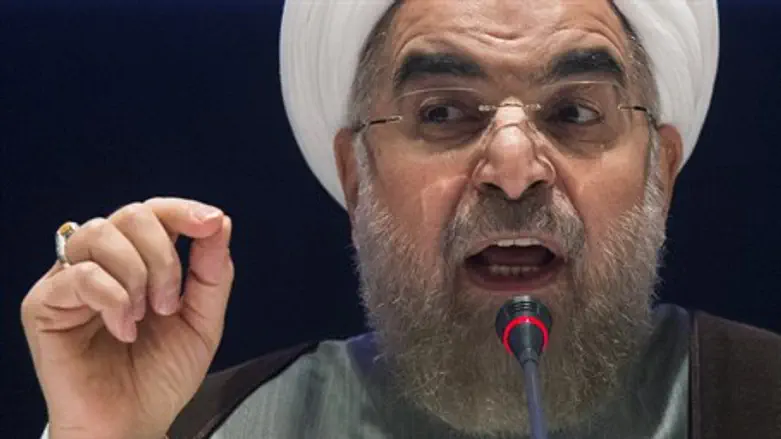
Iran's President Hassan Rouhani unveiled the country's latest domestically produced surface to surface missile on Saturday, saying such weapons are necessary for "defense" - despite his nation's active offensive actions throughout the region, most recently in proxy rocket attacks against Israel on Thursday.
The Fateh (Winner) 313 ballistic missile has a 500-kilometer (300 miles) range and features more advanced sensors and technology, according to Sepah News, the website of the Iranian Revolutionary Guards.
It was rolled out little more than a month after Iran and world powers concluded a deal that requires Iran to curb key parts of its nuclear program in exchange for a lifting of economic sanctions.
The missile was displayed as part of Defense Industry Day, an annual event that showcases Iran's hardware, during which a new fighter jet meant to combat Israel was deployed to the Iranian Air Force.
"A weak country incapable of confronting and defending against the military power of its neighbors and enemies cannot claim to seek peace," the president said in a televised speech.
"Iran's strategy is based on defense and deterrence. The first line is diplomats and the second line is generals. Diplomats should be backed by generals. If they fail, it is the generals' turn to come forward," he said, in a clear indication that military action will follow the failure of nuclear diplomacy.
Several versions of the Fateh missile have been produced in the past few years. The 313 model has been successfully tested and is scheduled for mass production, the Sepah News report said.
Iran has vowed to flout the UN resolution passing the nuclear deal, in which Iran is required not to test long-range ballistic missiles that can be used to carry a nuclear payload. The Islamic regime has made clear it intends to hold such tests regardless.
Despite its protestations to the contrary, Iran's domestic long-range ballistic missiles are in fact nuclear capable according to international reports, particularly the Shahab 3 and Sejjil 2.
The UN Security Council resolution adopting the nuclear agreement bars Iran from owning missiles "designed to carry nuclear warheads," and stipulates that transfer to Iran of ballistic missile technology during the next eight years will be subject to the approval of the council.
The US has said it would veto such requests.
AFP contributed to this report.
